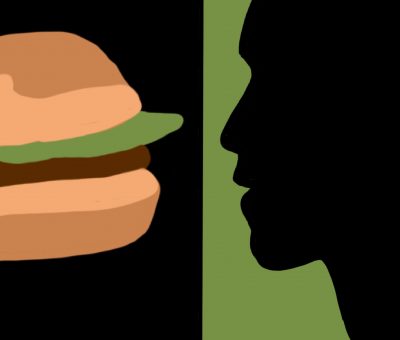Gov. Kim Reynolds, R-Iowa, designated April as “Meat on the Table” month. The announcement was a right-wing culture war response to a “MeatOut” declaration from Gov. Jason Polis, D-Colo. I usually have no taste for this kind of performative nonsense, but I make an exception for the foods that make meals worth eating.
I love meat — pork chops, steak, pork tenderloin, burgers, bacon, you name it. I feel bad for people who didn’t grow up in a place where high-quality meat was readily available at a low price.
Recently, the meat industry has come under attack from environmentalists who say factory farming leads to deforestation and increases global warming.

A few years ago, this information was new to me: I didn’t know meat played a role in climate change. However, I did not change my diet, and I scorn anyone who shames others for making different, “immoral” decisions about what to put in their body.
There are some things in life that are worth even the highest of prices. The same paradox on a famous Roman epitaph applies to a meat-eating diet: Meat destroys our planet, but meat “makes life worth living.”
Do we want to live in a world without steak, burgers, bacon and chicken nuggets? I sure don’t. The last thing I need is environmentalists wagging their fingers at me for buying a pound of delicious bacon from a local family farm.
We also must be aware of farmers’ reliance on a meat-eating society.
It’s not just ranchers or those who raise livestock who profit off of meat. Much of the corn, soybeans and other crops raised in the United States are grown to feed livestock. For example, about 36% of corn grown in the country is used as animal feed.
If someone waved a magic wand to make the meat industry disappear, calamity might ensue. More than one-third of the corn produced in the country would lose its original purpose — not to mention all the processors and distributors of animal products and the products themselves.
How many jobs would be lost on ranches, in processing plants, butcher shops and every other field that the meat and poultry industry touches? About 530,000 people have jobs directly in meat and poultry, and another 5.4 million in related fields, according to the North American Meat Institute.
It is easy to dismiss meat production as a biohazard with limited upside until economics is brought into the equation.

U.S. agriculture would need a complete rehaul if it could no longer profit from producing meat. And this column has not yet touched on the potential effects on the restaurant industry, too.
What is a barbecue restaurant going to serve without meat? What are most restaurants going to serve without meat? Vegetarian options at some restaurants remain slim, and in my opinion, generally less appetizing than entrees with meat.
One also must consider how many people meat feeds in the United States. Americans spend a lot less on food than other major countries. For instance, about 6.5% of household expenditures in the United States are on food, but in China, that figure is over 25%.
The relatively low price of meat is a significant factor in the low cost of U.S. food — the reasons being agricultural subsidies and innovation — but either way, the result stands: Americans can eat for cheap.
Some people simply cannot afford to cut meat out of their diet while remaining healthy. With meat out of the picture, who knows what would happen to the relatively low prices of U.S. food?
Driving meat out of the market and watching the price of protein options skyrocket in consequence would be even worse. One in 10 U.S. households already experiences food insecurity. No American should be struggling to find their next meal, and the last thing households struggling with food security need is to be mocked or shamed for purchasing ground beef. Let’s not add to their plight with sniffy moralizing.
If you add up the economic, cultural and pleasurable aspects of meat eating, opposing someone else’s consumption of a food staple starts to look more like grandstanding than conscientious objection.
In a few weeks, I look forward to eating short ribs from Nelson’s Meat Market and letting the anti-meat activists howl into the wind.